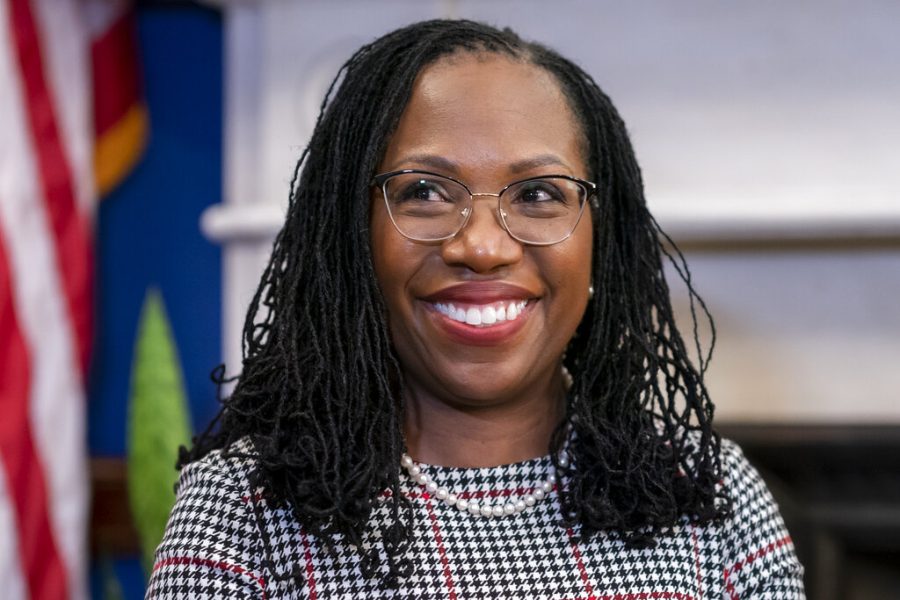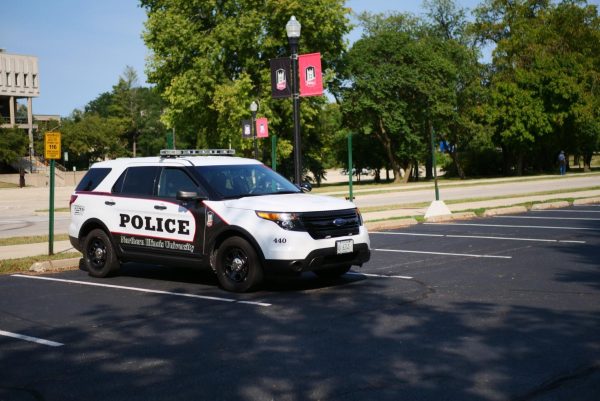Brown Jackson, more than just the high court’s first Black woman nominee
Brown Jackson’s hearing concluded March 24 and is awaiting Senate confirmation.
J. Scott Applewhite | Associated Press
Supreme Court nominee Ketanji Brown Jackson smiles during a meeting with Sen. Tommy Tuberville, R-Ala., in his office at the Capitol in Washington, Tuesday, March 29, 2022. (AP Photo/J. Scott Applewhite)
DeKALB — On Jan. 27, Justice Stephen Breyer announced his retirement from the Supreme Court after serving for 27 years. The Supreme Court of the United States is made up of nine justices and with Justice Breyer retiring, it opened a chance for President Joe Biden to nominate a new justice to the court and to help make history.
Biden nominated Judge Kentaji Brown Jackson, who is the first Black woman to be nominated. Jackson was born in Washington, D.C., but grew up in Miami, Florida.
Jackson was student body president at Miami Palmetto Senior High School. While in high school, she set her goals on going to Harvard and ended up going there. She graduated from Harvard magna cum laude and then attended their law school. At Harvard Law, she was an editor of the Harvard Law Review and graduated cum laude.
Jackson has a lot of experience within the judicial system. She was a public defender, vice-chair of the U.S. Sentencing Commission, judge in the U.S. District Court for District of Columbia and judge in the U.S. Court of Appeals for the D.C. Circuit. Jackson’s first position was a Supreme Court clerk under Breyer.
Jackson will also be the first former public defender to serve the Supreme Court.
For when she was vice-chair of the sentencing commission, she was nominated by President Obama back in 2009 and confirmed in 2010. Again, she had followed her successor, Breyer, who had also worked on the commission. Obama then nominated her again to be a judge in the U.S. District Court of D.C. and was confirmed in 2013.
Before Jackson’s SCOTUS nomination, she was recently a judge on the U.S. Court of Appeals which was Biden’s doing in 2021.
To be confirmed, the nominee needs a Senate majority of vote. During this hearing, she was questioned about her decisions as a judge, her sentencing on child pornography cases, if she could fairly judge a catholic person, and other questions involving transgender rights and critical race theory. Associate Dean of Academic Affairs for College of Law and associate professor Yolanda King explains the process.
“After the nomination, there are hearings conducted by the Senate Judiciary Committee, which started on March 21,” King said. “The hearings started with statements from committee members and senate judiciary members, they introduced Judge Jackson. Questioning followed on Tuesday and Thursday. Then followed a closed session to discuss the matters related to Judge Jackson’s FBI background investigation, which is customary. The hearings concluded with statements by additional witnesses.”
Tensions increased as Republican and Democratic senators clashed over the questions and confirmation rules.
“On multiple occasions, Cruz tangled with Senate Judiciary Committee chairman Dick Durbin (D-Ill.), with Durbin at one point cutting off the Texas senator after he attempted to go over his allotted 20 minutes to keep questioning Jackson. ‘You have to follow the rules,’ Durbin shot back,” the Hill reported.
Tensions were settled when Democratic Senator Cory Booker reminded everyone to take a step back and look at this historic moment as she is the first Black woman nominated to SCOTUS.
“You have earned this spot,” Booker told Jackson in his speech.
King also recognizes this historic moment for Black women in the legal field and Black women everywhere.
“It’s an exciting moment to know that we’ve reached this point in our history, where a Black woman has been nominated and could be confirmed,” King said. “That the bench will be more inclusive.”
The hearing concluded on March 24 and is awaiting Senate confirmation, which does not have a set date.












